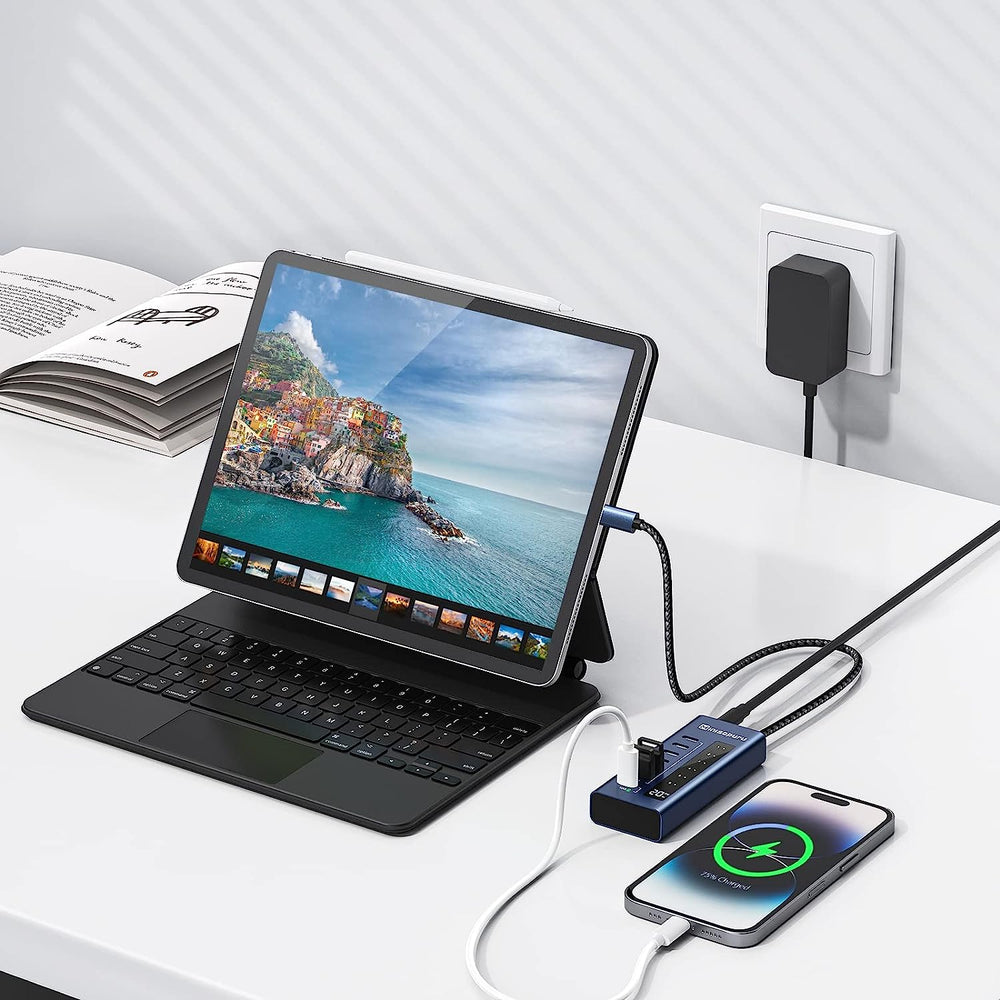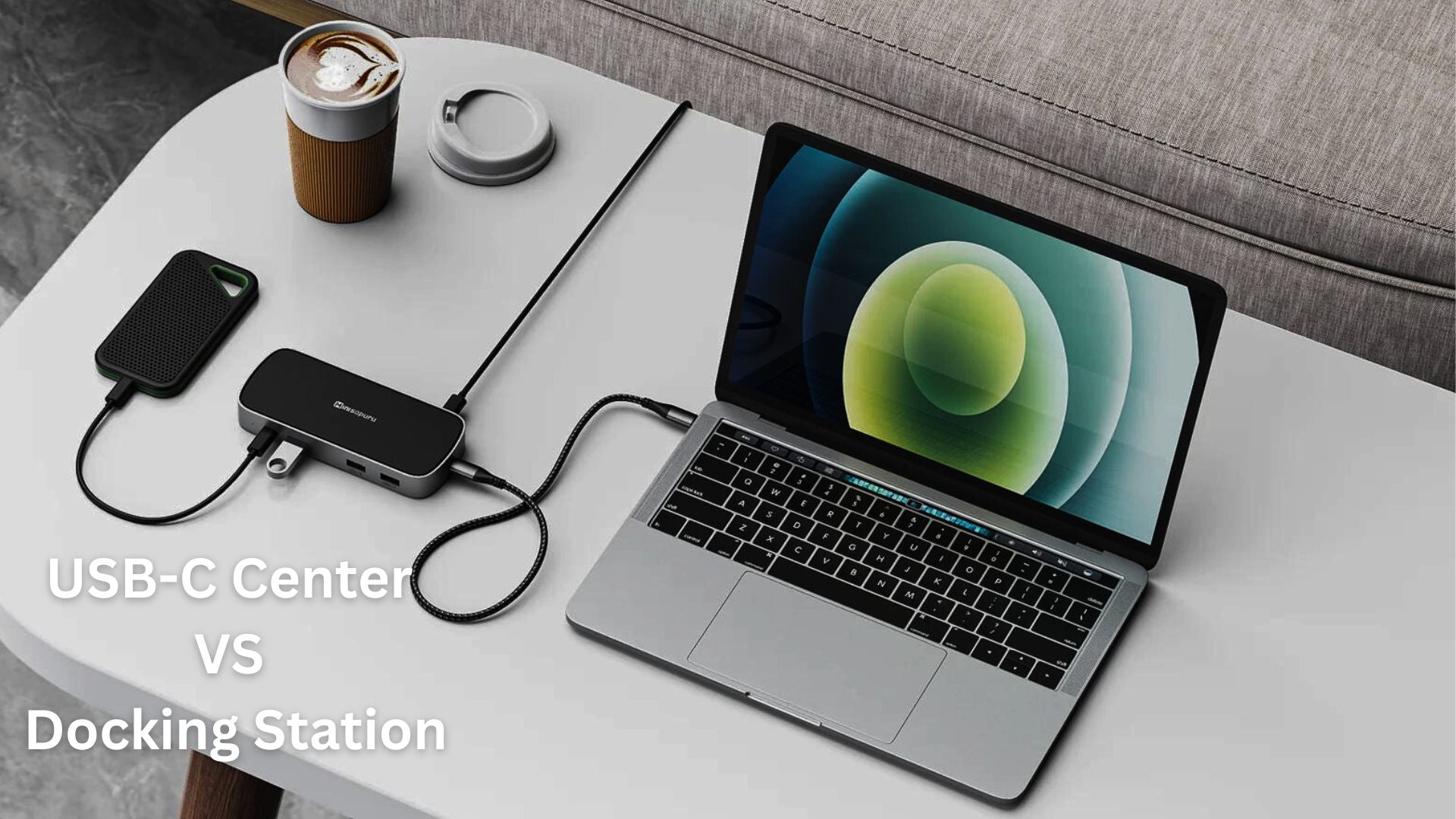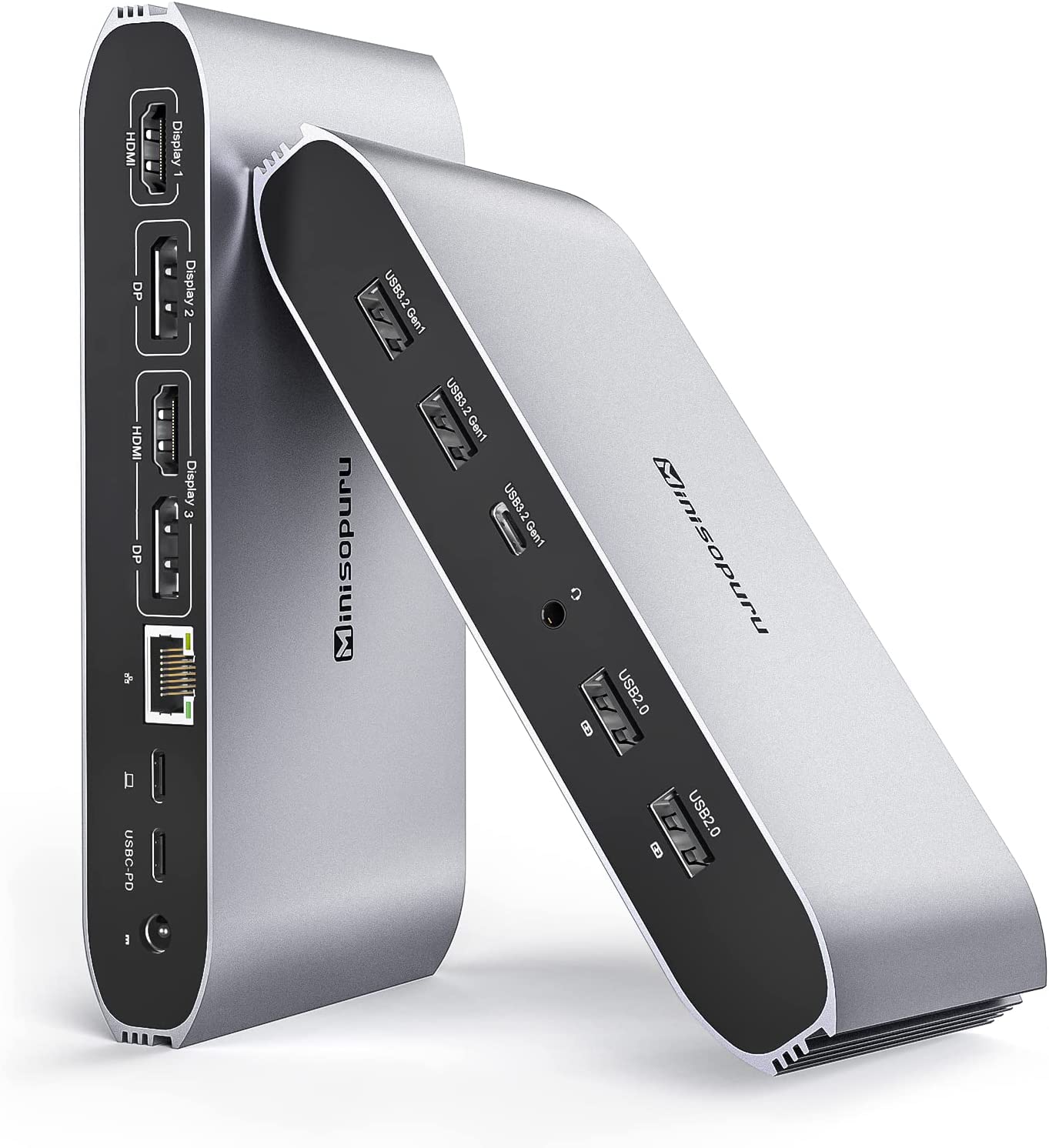At your desk or on the go, are you forever unplugging devices from your laptop and buying countless port adapters and dongles? A docking station can save you from those hassles, providing extra connectivity and acting as a central hub for all your devices and displays. (Plus, it might allow you to carry a leaner laptop, with fewer ports.)
You might be familiar only with old-school, proprietary docking stations, into which you would click or slide your notebook. The dock would interface with your laptop via a vendor-specific port or slot. Today's generic USB and Thunderbolt docks, in contrast, do it all through a single cable.
Anyone who wants to transform their Apple laptop into a true office behemoth must invest in one of the best MacBook Pro docking stations. Let’s find out more about the USB-C docking stations for MacBook Pro.
Introduction
Even though Latest MacBook Pros have more ports than ever before, there is always more equipment that can be plugged in. specifically if you need to connect multiple items simultaneously, such as screens, hard discs, or keyboards. One connector can be used for various inputs and outputs thanks to a MacBook docking station, which eliminates any plugging stress from the MacBook itself.
It can be easier to connect numerous gadgets we use on a daily basis for our business and personal lives by adding extra Thunderbolt 4 ports to your computer or bringing back old favorites like full-size USB-A connectors.
A. Explanation of what a USB-C Docking Station is
But with the appropriate dock, that's no longer a concern. You can attach everything else, including monitors, mice, external hard drives, smartphones, and headphones, by simply plugging it into your MacBook's USB-C connection.
B. Benefits of using a docking station for a MacBook Pro
And there's more! Some of the better MacBook Pro docks also provide pass through charging, cable internet, and SD card ports so you may charge your laptop simultaneously.
For example, with the Belkin Thunderbolt 3 Dock Pro, you get 85W of power for your MacBook, support for Ultra-High Definition monitors, up to 40 GBPs transfer rates, and compatibility for a variety of peripherals via Thunderbolt, USB-A, USB-C, Ethernet, SD, and Audio connections – all over the course of a single cable.
C. Overview of the different types of docking stations available
Standard, industrial, high-security, and public terminals are the four different varieties of laptop docking stations. These variants are all based on laptops that are at least 14 inches (35.6 cm) wide and are incompatible with smaller devices.
II. Factors to Consider when Choosing a Docking Station for MacBook Pro
Because laptop docks can be pricey, you should give your purchase careful consideration. There are several laptop docking stations available, and they all have different features. But don't just choose a dock based on the number of ports it has. In that case, how do you pick a laptop dock? Let's find out.
A. Compatibility with MacBook Pro models
The number of laptop and docking station manufacturers is equal. It's true that not everything is made in the same way. When purchasing a laptop docking station, compatibility is a key factor to take into account. After all, a docking station that doesn't work with your laptop is essentially useless.
The majority of laptop manufacturers also produce their own docking stations to aid with compatibility difficulties. When looking for docking stations, you'll discover that proprietary solutions are frequently pricey. And for good reason—not only are these assured to work with the manufacturer's laptop line, but they will also provide a thorough experience.
You are not required to purchase from your laptop maker, though. Universal laptop docking stations support many platforms out of the box and function with a wide range of laptops. The only drawback is that some functionalities might not be compatible with all platforms.
B. Number and types of ports available
Adding more ports to your device is one of the main reasons to purchase a laptop docking station. That won't be the case, though, if the laptop docking station you purchase lacks a variety of ports. Thankfully, since docking stations typically offer a range of ports, you don't need to worry too much about this. The Baseus 17-in-1 USB C Docking Station, one of the best laptop docking stations, with up to 17 connectors.
The most popular connectors include Thunderbolt 3 or 4, DisplayPort, HDMI 2.0 or 3.0, USB-C (with or without Power Delivery capability), USB Type-A, Gigabit Ethernet, and 3.5mm headphone jack. A reader for SD and microSD cards is also included.
C. Charging capability
The power output is another typical issue to watch out for. Power outputs will vary between docking stations. A docking station with similar or higher power output, like StarTech's USB C dock, is what you should search for if your laptop supports fast charging, such as the 96W capable M1 Max MacBook Pro. If not, you won't be able to charge your device as quickly as you can when using a regular laptop adapter.
D. Design and form factor
Docking stations can be made in one of two basic configurations: vertical or horizontal. Due to space considerations and their propensity to fit on any worktable, horizontal designs are typically favored by the majority of users. A vertical docking station, which has a smaller footprint on the worktable, is preferred by certain users, though. In the end, it all comes down to how your workplace is set up and whatever option you feel best suits your requirements.
When selecting a docking station, size can also be crucial. Since there are fewer devices to connect to when working from home, most people like a smaller docking station. Small-sized docking stations, on the other hand, might not be the best choice for many large businesses, since each employee often has a variety of devices to use and connect to.
E. Price and budget considerations
The price of the docking stations can differ greatly, you can find low-cost to high-end devices according to your budget. Keep in mind your needs and then choose the best docking station for your MacBook.
III. How to Set Up and Use a USB-C Docking Station with MacBook Pro
Once you've chosen a docking station that works with your MacBook Pro, you might need to set it up precisely to ensure optimal performance. A step-by-step guide is available for setting up a docking station with your MacBook Pro:
Before using new SD cards or USB or Thunderbolt devices with your Mac laptop computer that is built with Apple silicon, you must first allow connections to be made.
You receive a notification asking you to authorize the accessory to connect when you use a new or unidentified USB accessory, Thunderbolt accessory, or SD card with a Mac notebook running macOS Ventura or later with Apple silicon. Before allowing a device to connect, you must unlock your Mac if it is locked.
Your Mac won't recognize the accessory or grant it access to your Mac's data if you select Don't Allow. However, the attachment can still be used to recharge your Mac or itself. You will be prompted to approve a new connection request the following time you use the item. Check your settings or make sure you're running the most recent version of macOS if you don't receive an alert when you connect an accessory.
After that:
- Modify the connection settings for accessories.
- By default, a new or unidentified item will request your permission to connect to your Mac laptop with Apple silicon.
How to modify this setting:
- Choose System Settings from the Apple menu.
- Click Security & Privacy.
In the pop-up window that appears next to the phrase "Allow accessories to connect," scroll down and select your preferred option.
And that’s it you are good to go now!
B. Tips for optimizing the performance of the docking station
Consider the following advice to ensure that your docking station runs as efficiently as possible:
- Use high-quality cables to ensure a secure connection between the docking station and your MacBook.
- Firmware and drivers should be present to give maximum optimization.
- Use an appropriate power source to let your docking station can control all the connected devices.
- Avoid overloading the docking station by attaching several power-hungry peripherals or devices.
C. Troubleshooting common issues with docking stations
Troubleshooting. If your external display isn't detected or appears blurry on your Mac for instructions on how to fix the problem. Check your Technical Specifications if you're unsure of how many external monitors your MacBook Pro can support. Locate Video Support by opening System Settings, selecting Help > MacBook Specifications, and then scrolling.
Conclusion
Given all the factors, it's up to you to think about purchasing a laptop docking station. In summary, laptop docking stations increase the number of ports on your laptop, assist in creating an ergonomic workstation for your laptop, guarantee a smooth transition between the home and business, and allow you to connect older devices with outmoded connections.
Finally, docking stations bridge the functional gap between laptops and desktops, so you do not need to purchase one. USB-C docking stations are a crucial piece of equipment for MacBook Pro customers who need a variety of ports and devices for either personal or professional use. By taking into account the factors discussed in this article, you'll choose the best docking station for your unique requirements and benefit from enhanced comfort and efficiency in your daily schedule.




